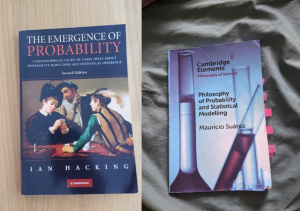A post by Alessio Zakaria, PhD student on the Compass programme.
Introduction
Probability theory is a branch of mathematics centred around the abstract manipulation and quantification of uncertainty and variability. It forms a basic unit of the theory and practice of statistics, enabling us to tame the complex nature of observable phenomena into meaningful information. It is through this reliance that the debate over the true (or more correct) underlying nature of probability theory has profound effects on how statisticians do their work. The current opposing sides of the debate in question are the Frequentists and the Bayesians. Frequentists believe that probability is intrinsically linked to the numeric regularity with which events occur, i.e. their frequency. Bayesians, however, believe that probability is an expression of someones degree of belief or confidence in a certain claim. In everyday parlance we use both of these concepts interchangeably: I estimate one in five of people have Covid; I was 50% confident that the football was coming home. It should be noted that the latter of the two is not a repeatable event per se. We cannot roll back time to check what the repeatable sequence would result in.


